2010 Value SSD (~$100) Roundup: Kingston and OCZ take on Intel
by Anand Lal Shimpi on June 3, 2010 12:01 AM ESTOverall System Performance using PCMark Vantage
Next up is PCMark Vantage, another system-wide performance suite. For those of you who aren’t familiar with PCMark Vantage, it ends up being the most real-world-like hard drive test I can come up with. It runs things like application launches, file searches, web browsing, contacts searching, video playback, photo editing and other completely mundane but real-world tasks. I’ve described the benchmark in great detail before but if you’d like to read up on what it does in particular, take a look at Futuremark’s whitepaper on the benchmark; it’s not perfect, but it’s good enough to be a member of a comprehensive storage benchmark suite. Any performance impacts here would most likely be reflected in the real world.
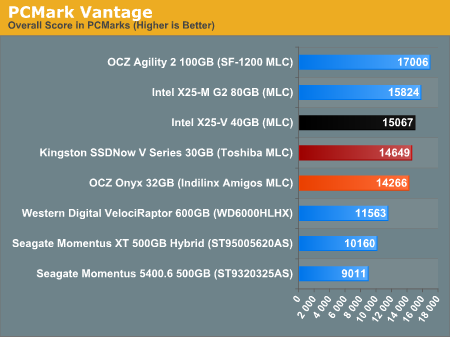
Combining sequential and random performance into a real world workload is what we get from PCMark Vantage. The overall score has Intel in the lead, followed by Kingston and finally OCZ's Onyx. The standings don't change in the HDD specific Vantage suite.
The memories suite includes a test involving importing pictures into Windows Photo Gallery and editing them, a fairly benign task that easily falls into the category of being very influenced by disk performance.
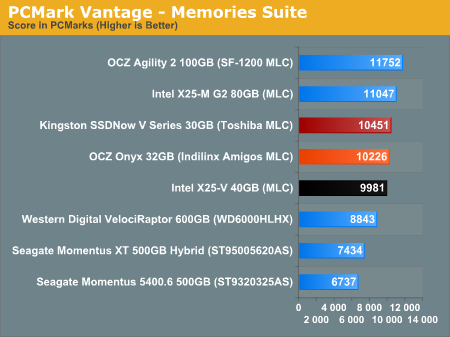
The TV and Movies tests focus on on video transcoding which is mostly CPU bound, but one of the tests involves Windows Media Center which tends to be disk bound.
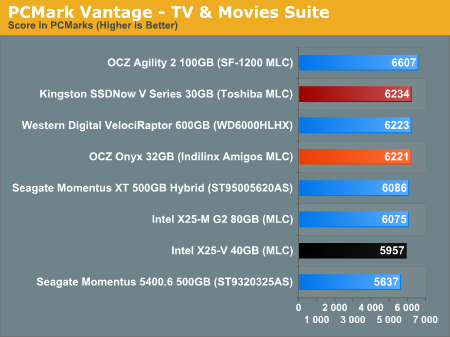
The gaming tests are very well suited to SSDs since they spend a good portion of their time focusing on reading textures and loading level data. All of the SSDs dominate here, but as you'll see later on in my gaming tests the benefits of an SSD really vary depending on the game. Take these results as a best case scenario of what can happen, not the norm.
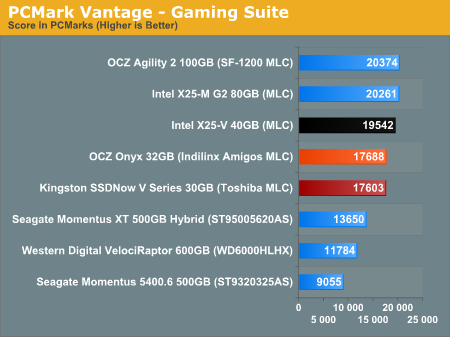
In the Music suite the main test is a multitasking scenario: the test simulates surfing the web in IE7, transcoding an audio file and adding music to Windows Media Player (the most disk intensive portion of the test).
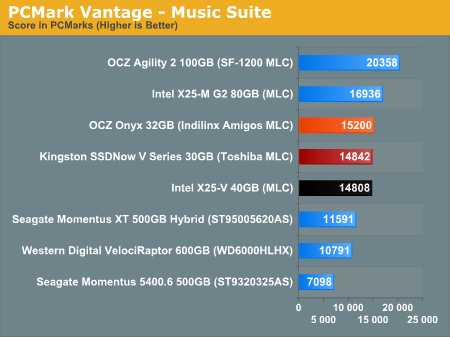
The Communications suite is made up of two tests, both involving light multitasking. The first test simulates data encryption/decryption while running message rules in Windows Mail. The second test simulates web surfing (including opening/closing tabs) in IE7, data decryption and running Windows Defender.
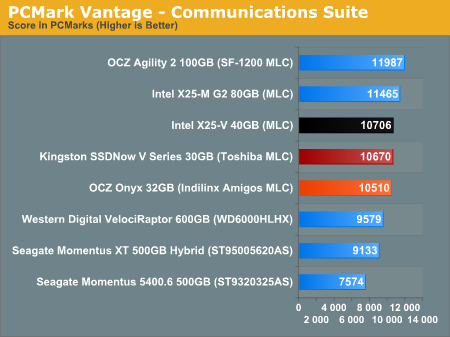
I love PCMark's Productivity test; in this test there are four tasks going on at once, searching through Windows contacts, searching through Windows Mail, browsing multiple webpages in IE7 and loading applications. This is as real world of a scenario as you get and it happens to be representative of one of the most frustrating HDD usage models - trying to do multiple things at once. There's nothing more annoying than trying to launch a simple application while you're doing other things in the background and have the load take forever.
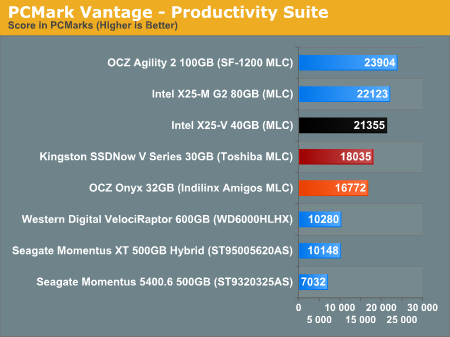
The final PCMark Vantage suite is HDD specific and this is where you'll see the biggest differences between the drives:
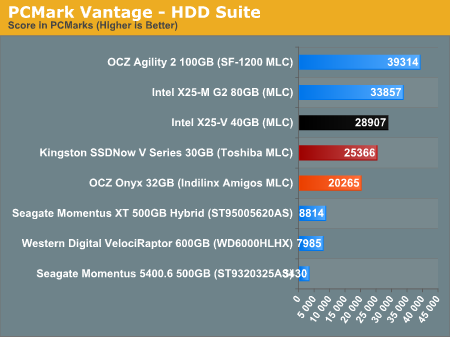










49 Comments
View All Comments
cknobman - Thursday, June 3, 2010 - link
Your reviews always show a breakdown of how a drive performs before and after TRIM. How are you issuing the TRIM command? I thought by default Windows 7 always issued the TRIM command on every operation as long as your drive supported it.gaspard - Sunday, June 6, 2010 - link
well you can disable it via Windows' fsutil command: fsutil behavior query DisableDeleteNotify NO TRIM: fsutil behavior set DisableDeleteNotify 1 TRIM ON: fsutil behavior set DisableDeleteNotify 0GullLars - Thursday, June 3, 2010 - link
I've been waiting for an article like this for a few months now, and you did a good job Anand, as always ;)I have a couple of questions:
Why not include OCZ Agility 30GB? ($119 @ newegg)
Why only test random write and not read at QD 32?
There is little difference in random writes, but random reads double for the x25-V, and i'd guess increase a bit for the Onyx too.
A full Barefoot drive can do 60MB/s random read @ QD 5.
x25-V can do about 70MB/s @ QD 4, and about 100MB/s @ QD 8 for random reads.
Why not include PCmark Vantage HDD subscores?
They are made to showcase the strong and weak points of storage performance, and are relevant to what drive to pick. The total HDD score can be the same for two drives with completely different strenghts.
Dylock - Thursday, June 3, 2010 - link
The OCZ Agility 60GB is on sale at Amazon.com for 144$, as of today. That's $2.4 per GB.An Indilix controller to boot. The lower grade memory comes into play for performance , but not by much.
Movieman420 - Thursday, June 3, 2010 - link
Currently a 30gb Vertex is $109 ($99 after rebate)! Instead the Onyx was used which uses 'half' of an Idilinx controller (Indilinx Amigo). I know you had an Onyx handy cuz of recent testing but really. Even tho the Vertex is 'old gear', it woulda blew the doors off the other drives in your testing.u.of.ipod - Thursday, June 3, 2010 - link
I want a SSD for my HTPC. Hopefully it can be shutdown and booted up more quickly, be more responsive in Windows Media Center 7 and finally to provide space for a second 3.5" storage drive. Is one of these value drives for me? Should I just choose a 2.5" mechanical drive instead?kmmatney - Friday, June 4, 2010 - link
The Intel 40 GB SSD works fine on Windows XP without TRIM. Just install the Intel SSD Toolbox, and it will perform a "TRIM" or garbage collection routine automatically, once a week.kmmatney - Friday, June 4, 2010 - link
Whoops - was supposed to be a new comment, and not a "reply"...gaspard - Sunday, June 6, 2010 - link
whichever one you like, and NO... those are the answers respectivelymrmike_49 - Saturday, June 5, 2010 - link
I'd like to see tests of loading times for various games, start-up as well as level loads. Games are an ideal use for SSDs, many many Reads, very few Writes. A $100 SSD that could triple my load speed (or more) would be nice.How about redoing this review, concentrating on actual load start-up times and level loads of popular games??!!